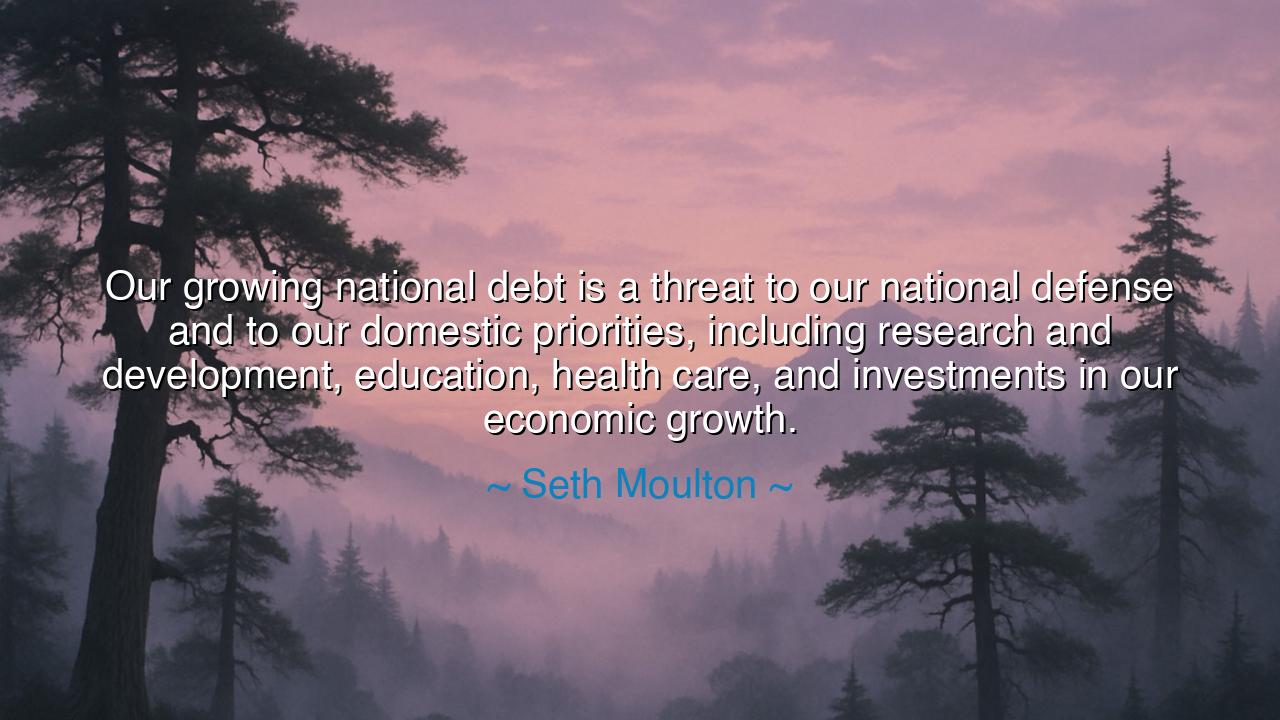
Our growing national debt is a threat to our national defense and
Our growing national debt is a threat to our national defense and to our domestic priorities, including research and development, education, health care, and investments in our economic growth.






The words of Seth Moulton rise like a solemn warning across the fields of time: “Our growing national debt is a threat to our national defense and to our domestic priorities, including research and development, education, health care, and investments in our economic growth.” In this truth lies both wisdom and lament — for he speaks not only of numbers written upon ledgers, but of the delicate balance of a nation’s soul. Debt, in his vision, is not merely a matter of gold and interest, but a shadow cast over the future itself. When a nation consumes beyond its means, it borrows not only from its treasury, but from the hands of its children.
In the ancient world, the elders taught that prosperity must be built upon stewardship, not indulgence. A great city that devours all its grain in a single season leaves its next generation hungry. Likewise, a nation that binds itself in chains of debt for fleeting comfort weakens its foundations. Moulton, a soldier turned statesman, speaks with the heart of one who has seen the price of strength — the truth that defense is not measured in weapons alone, but in the health and wisdom of the people. When the treasury groans beneath excessive burden, the pillars of learning, innovation, and care begin to crack.
Consider the fall of Rome, that mighty empire which once spanned continents. Its legions were unmatched, its wealth unrivaled — yet over time, the state grew addicted to excess. Wars drained the coffers, while corruption devoured from within. To sustain its appetite, Rome borrowed, debased its coin, and taxed its citizens to despair. Roads crumbled, schools withered, and loyalty decayed. By the time the enemies gathered at its gates, the empire had already fallen in spirit. Thus does Moulton remind us: a nation that spends beyond wisdom endangers not only its defense but its destiny.
Yet his warning is not one of despair, but of awakening. He speaks of the sacred duty to balance strength with prudence, ambition with foresight. The greatness of a people lies not in how much they spend, but in how wisely they invest. For every coin misused on vanity could have been a seed for education, a cure in health care, or a spark of research and development that propels humanity forward. A nation’s true security lies in the minds of its thinkers, the health of its citizens, and the vigor of its industries. To neglect these in the name of reckless debt is to guard the walls while the heart within withers.
In the halls of history, we find examples of renewal born from restraint. After the devastation of World War II, nations like Japan and Germany rebuilt themselves not through conquest or waste, but through careful stewardship of resources — investing in education, infrastructure, and innovation. They rose from ashes to prosperity because they understood that the wealth of a nation flows not from endless borrowing, but from disciplined investment in its people. In this, we find the living spirit of Moulton’s call: to think not as spenders of fortune, but as guardians of the future.
There is also a deeper, more personal echo within his words. For what is true of nations is true of individuals. To live beyond one’s means, to chase fleeting desires at the cost of stability, is to sow the seeds of dependence. But to live with purpose and moderation — to direct one’s resources toward growth and goodness — is to build a fortress that no storm can easily breach. Whether for a household or a republic, wisdom in spending is wisdom in living.
And so, the lesson of Moulton’s quote is clear and enduring: Debt is not merely a fiscal matter — it is a moral one. It is the measure of whether a people think of themselves or their descendants. Let us, then, act as wise stewards of what we have been given. Let our governments invest not in fleeting glory, but in lasting foundations: in schools, in health, in innovation, in the strength of the citizen. Let each of us, too, live with foresight — building, saving, and serving, so that those who come after us may inherit not a burden, but a blessing.
For as the ancients taught: “A tree that drinks too deeply from borrowed waters will one day find its roots poisoned.” Let us, therefore, tend our garden with care — pruning excess, watering with intention, and planting with vision. Only then shall our nations, like mighty oaks, stand firm against the tempests of time — their branches strong, their roots deep, and their legacy everlasting.






AAdministratorAdministrator
Welcome, honored guests. Please leave a comment, we will respond soon